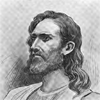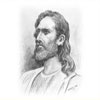On The Travels Of Jesus
 by Saul of Tarsus (as channeled by Alexander Smyth)
by Saul of Tarsus (as channeled by Alexander Smyth)
Friend Alexander, from the nature of the Intelligence which now I wish to impart to you, the numerous and disconnected parts contained therein, I find it surpasses my ingenuity and skill to convey it to you in the form of a vision, therefore I shall be constrained to use the mode of simple address or relation. I shall so endeavor to impress your mind that you may re-commit it to paper from your memory. To relate all the travels and adventures of Jesus and his followers in detail would be very difficult, even if it were possible to gather all the accounts from the spirits who were concerned therein when mortals on the earth; but as Judas has informed me there was a great sameness or similarity in them, I shall not impose so heavy a task upon you, even if I were able to do so. I shall, therefore, speak of them as a whole—with the exception of the scenes and events, with which I have already impressed you—during his several tours through Judea and Galilee; and I shall then re-commence my mode of impressing you by visions with regard to the remainder of his career, where he returns to the vicinity of Jerusalem for the last time.
Throughout the numerous towns, villages and country places where Jesus passed, he made a great impression upon the people, for he was generally well received by them. Even in places where his fame had not reached, his noble, manly appearance and amiable manners made an agreeable impression, before he broached any of his doctrines. However suspicious they were at first, or whatever antipathies they took to his followers, they had no doubt of his being an intelligent and good man. His most numerous admirers and adherents were among the poor, for he spoke to them in gentle and affable terms. He sympathized with them in their afflictions and calamities. He pointed out in a mild manner the irrationality and injurious consequences of vice. He cured some of their diseases, and he relieved others. He taught them how to live a virtuous life, and with the greatest of patience and in the simplest manner did he endeavor to enlighten them upon their own nature, the existence of their souls, and the existence of a true God.
With the wealthy he was not so successful; he did not pamper their vanities; he did not flatter them, or bow obsequiously to them; he did not approve of their ambitious schemes or pride of rank, but he made war upon all those things on which they chose to exalt themselves. Although he did not make many converts among them, yet they treated him with general respect.
The Roman officers treated him with marked respect, for they saw that he was a superior man to the generality of the Judean people. They compared his ideas with those of the Roman and Grecian philosophers, and found that in his, there was a great similarity with their best philosophy. The only enemies he encountered during his travels were in the priesthood, and others under their influence. We will not include in this notice his great enemy, who was myself, with Judas my confederate; for the heinous nature of our deeds are partly known to you, and the remainder will be given elsewhere. But the priesthood saw that if the doctrines and influence of Jesus extended over the country the temple, the altar, and even the mitre of the High Priest were all doomed to destruction, consequently, they were his declared enemies. The priesthood would have doomed him to destruction long before they did, had not I thought it necessary to achieve my ends, to allow Jesus to run a longer career. As it was, the priesthood gave Jesus all the annoyance, insult, and petty injuries they could.
The conduct and doctrines of Jesus were incapable of making enemies, from their incapacity of doing evil. His demeanor was so amiable and just that neither friends nor foes could feel injured by it, and his doctrines were productive of nothing but good results to all those who adhered to them. How, then, came he to have enemies? His enemies were only those whose ambitions and interests were sustained by the follies and corruptions of society. None other were his enemies, and none other sought to do him an evil. Strange as it may seem it is no less the truth, his greatest enemies were his two greatest admirers, Saul and Judas. I, Saul, considered Jesus as a model of a noble man, but my heart being callous and my mind remorseless, I chose to sacrifice him to my insane ambition. But Judas not only admired him as the most amiable and virtuous of men, but he had a feeling of pity when he reflected how Jesus was surrounded and enmeshed by a set of sordid, ambitious wretches; and he wept tears of agony when he reflected upon his own conduct towards him, even previous to his final act of treachery.
The physical or scientific knowledge of Jesus was very limited, yet he knew as much as any who made pretensions to learning, and more than the the generality of men. There was very little scientific investigation in his days. Whatever little was known of the phenomena of nature was acquired through common experience, and that little was kept a secret from the people instead of being used to their enlightenment. The secrets of nature were taught in the colleges of the Egyptians, and some others under the awful name of magic, as something emanating from supernal sources. Now, as Jesus traveled abroad in his youth to acquire knowledge, it is reasonable to suppose that he acquired a portion, at least, of what the colleges taught. It is evident that he had learned some true ideas of the solar system. He knew that the stars and planets were worlds similar to the earth, and that these bodies with the sun did not revolve around the earth; but the ignorance and prejudice of the people were so great he dared not declare it to be so. So it was with many other subjects of which he had a true knowledge. He did not declare them to the people, for if he had done so he would have appeared in their eyes as a magician instead of a moral teacher. It was in the moral sentiment that the strength, the beauty and wisdom of his knowledge existed. In this respect he was pre-eminent; in this he was powerful; in this he exemplified all the beauty, greatness and virtue of his short career. His experience and studies gave him a knowledge of the conditions of the people and the state of their minds. His intuitive ideas gave him the power to reform those conditions, and suggest others for the benefit of mankind at large, which if conformed to, would have produced a state of happiness on earth, and a prospect of future bliss. What is there more beautiful, more just, more rational, more in accordance with nature, and more beneficial to mankind than the ten classes of duties he gave to the people in his address at the foot of the mountain at Genesareth? There is nothing that can be produced in the form of a code of morals, so comprehensive and yet so compact. There is nothing to be dispensed with, and nothing lacking. Every form of duty which is capable and necessary to render a people happy is embraced in it; and everything superfluous, austere, cynical, or in anywise opposed to the development of our true natures, is excluded from it; therefore it may be said that his moral obligations are the best ever devised by man.
Jesus not only gave to the people the most complete code of morals, but he gave them in the most sublime and exalted ideas of man’s inward self. He gave glimpses of the nature of the soul and of the great God of the universe, not such as is taught in the Jewish theology under the name of Jehovah. He taught that the soul of man is a refined material element, an ever active essence of immortal existence, and that it originally was an emanation from the great God or active principle of life; that in its original nature it is pure, and by its alliance with grosser matter in the form of organized beings, it is capable of continuing pure, and becoming improved if we live in conformity with the principles of nature. That a man living a strictly good moral life his spirit or soul will continue to expand and improve during his life; at the termination of which it will be enabled to shake off this material body, and continue its existence in another state more suitable to its nature, where it will continue to enjoy unspeakable bliss in pursuing its onward progress. But should a man live a demoralized, wicked life, then his soul becomes impure by the predominating influence of grosser matter; then its original nature dies out, and he sinks down to a level, or below the inferior animals. Then at the termination of the man’s earthly existence his soul is too dense and grossly material to be enabled to ascend to that refined state of future existence where the virtuous and intelligent are alone allowed to go.
This doctrine of Jesus, though not exactly true as regards the spiritual world, was calculated to lead men in the right direction to obtain that desired future existence, and to make them eminently happy while on earth. That he was a true believer in the doctrines he taught, there is no reason to doubt, for all his conduct through life confirms his sincerity. He looked not to anything upon earth to reward him for his toils and sacrifices, in the endeavor to improve his fellow men. Nothing beyond the gratification of his own conscience did he desire to repay him for the loss of time, the expenditure of his small fortune, the anxiety, care and study he made for man’s welfare. He coveted not gold, silver, lands, rents or titles, for he saw nothing in this world worthy of acceptance. His eyes were cast on the future state where he anticipated a home and a condition suitable to his refined and exalted nature.
By these doctrines Jesus did immense benefit for man during his time, in awakening them to a knowledge of their low condition; and had it not been for his enemies in cutting short his career, mankind would have greatly improved from that date; but by the unaccountable changes in the destiny of man, evil predominated over good in his case. Soon after his death his sublime doctrines were either lost or perverted, and others silly and vicious substituted in their place. His healing powers and achievements were converted into absurd, lying accounts under the name of miracles, and his history into a compilation of fables. Instead of being represented what he really was, as a handsome, generous, amiable, intelligent man, he has been converted into a myth of an unnatural and impossible origin, of doubtful existence and nature, with such a termination to his career that it casts a diabolical and blasphemous slur upon the God of our existence.
But what of his followers (apostles)? If we can view Jesus in the light of one who was the model of true and noble manhood, when we contemplate the traits of character of his followers called his “apostles,” we may reverse the picture, and then we shall view them as a set of the most contemptible, ignorant, sordid knaves and traitors that ever lived to hatch knavery and treason on the earth. With the exception of Judas, every one of them had the most sordid motive of interest in attaching himself to Jesus. Judas was a traitor, it is true, yet he was a man of noble sentiment and fine feeling in comparison to the rest. Though he was under the necessity of performing the part he did by the manner in which I, Saul, coerced him, yet he was a great admirer of Jesus as a teacher and a man. Could Judas have been a free man in action there is reason to believe that he would have been the only sincere admirer and friend among the followers of Jesus. What were the motives of the two sons of Zebedee, John and James? They thought that Jesus was going to obtain great temporal power—to become a king, and they felt a sneaking inclination to become princes; so they attached themselves to him, hoping that they should realize their wishes when their master should arrive at his temporal eminence. Peter’s motives were of the same nature, and he lived to realize them in part. His object was to become a great man somehow, as Judas persuaded him he could be if he followed his directions. His object was to become the governor of a province, if possible, and if not, to wait for the death of Jesus when he was to become one of the heads of the new sect that was founded after Jesus’ death; this he lived to see accomplished. Andrew was under the guidance of his brother Peter, for the latter made it appear to his interest to follow Jesus. His mind being of a very low cast, he was obliged to act a subordinate part to his brother. All the rest were only followers in name, for they seldom accompanied him on any of his travels, nor did they take any part in the direction of affairs. Whenever Jesus visited a place where they were, they came to him, and in his absence undertook to repeat some of his sayings, which they soon converted into absurdities and nonsense. Some of those followers went so far as to pretend to cure diseases by their touch, and got whatever fees they could from the silly believers; besides, they were continually begging all they could get from all persons on whom the presence and doctrines of Jesus had made any impression. Thus these low sordid minded creatures, calling themselves the followers of Jesus cared nothing about him more then to make him the means of gratifying their selfish interest.
Excerpt from The True Life of Jesus of Nazareth – The Confessions of St. Paul
Posted in Book Excerpts, The True Life of Jesuswith comments disabled.





